How can plastic bag addiction be cured?
- Published
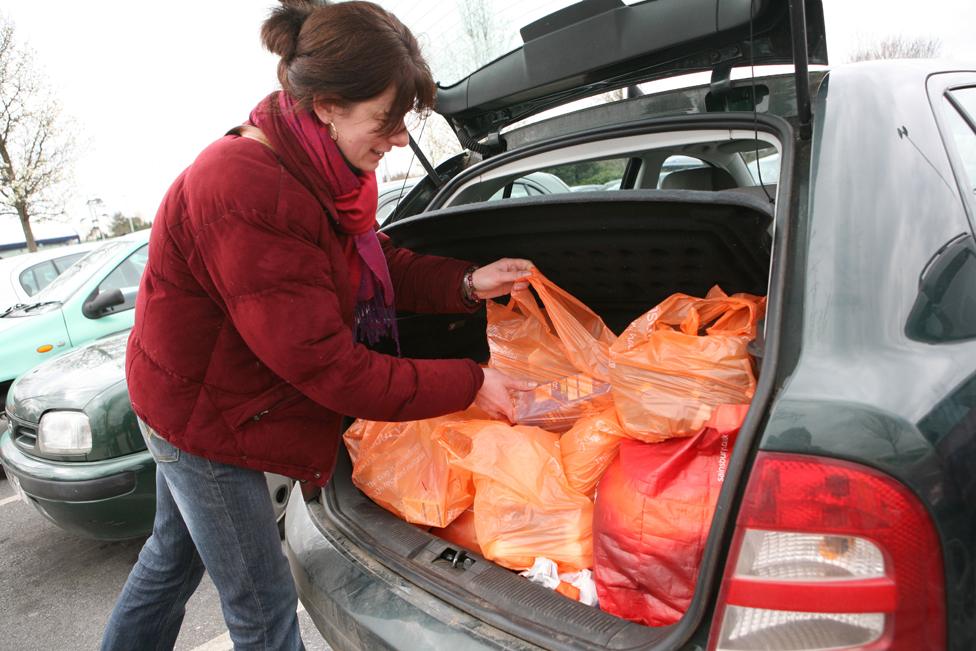
From Monday large shops in England will charge 5p for each plastic bag. But how did shoppers get so used to free carrier bags in the first place, asks Chris Stokel-Walker.
The Single Use Carrier Bags Charges (England) Order 2015 comes into force on 5 October.
The order requires sellers who employ more than 250 people to charge 5p for a "single use carrier bag" which is less than 70 microns (0.07mm) thick.
Though there are plenty of exceptions to the rule, external, including for medicines, raw meat and razor blades, having to pay for bags will be a major change for most English shoppers.
The history of the plastic carrier bag's ubiquity is slightly hazy, with no-one able to place a definitive date on the point when they were standard at all UK checkouts.
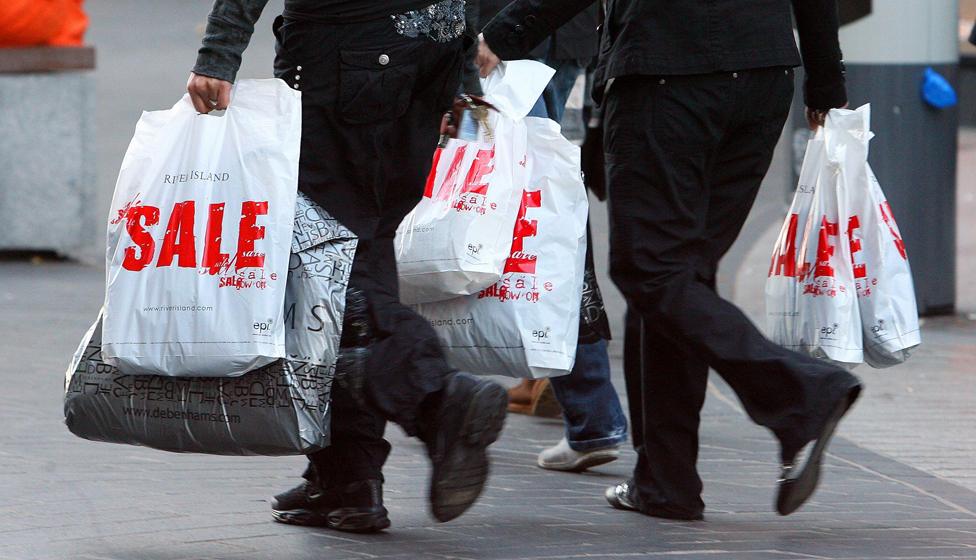
Swedish company Celloplast patented a "bag with handle of weldable plastic material, external" in the US in 1965. In the mid-1970s American department stores, including JC Penney, were using plastic bags for purchases, while the first polyethylene bags appeared in supermarkets across America soon after.
By the beginning of the 1980s the bags had reached British supermarkets and rapidly proliferated, although it seems Marks & Spencer had a plastic carrier by 1973. The coming of this emblem of convenience does not seem to have been considered particularly remarkable at the time. It wasn't the subject of newspaper columns.
"We've always had a culture of the bag just being there," explains retail consultant Graham Soult. He remembers the bags of the 1980s being much thicker, and of a better standard. "They didn't buckle when you put cat food in them, unlike today."
The same pattern applied across some but not all of Europe. There are countries such as Germany where per-bag charges have long existed.
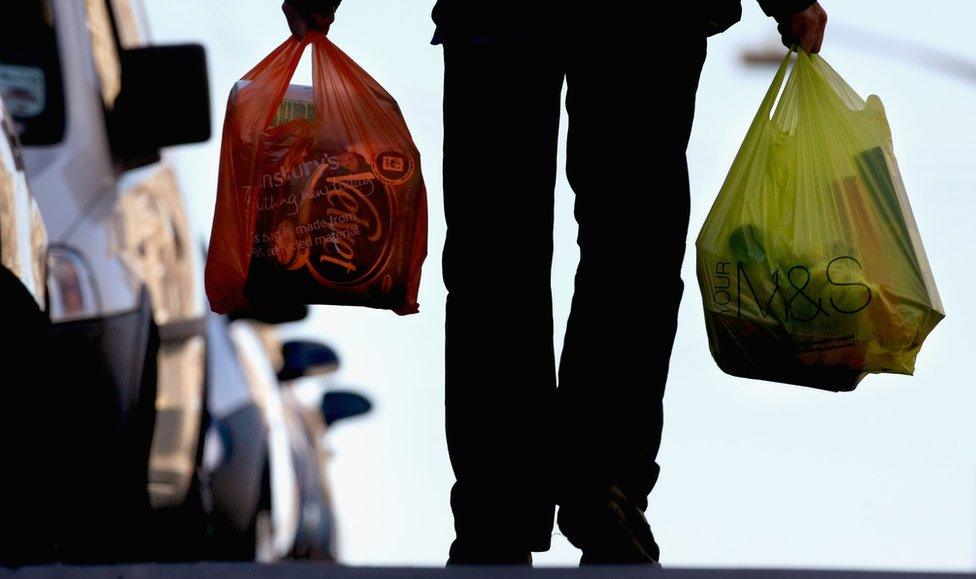
But offering free plastic bags has been a low-cost way to encourage custom. "Humans like to expand to meet capacity," James Intrilligator, professor of consumer psychology at Bangor University explains.
Before the era of the free plastic bag, people brought their own shopping bags. There might be paper bags provided for some items, but people didn't expect to be furnished with bags as a matter of course.
The Oxford English Dictionary's first reference to a carrier bag is from a 1907 catalogue from the department store Army & Navy. "The 'Sensible' carrier bag with strings is the only paper bag with a firm bottom, and capable of carrying wet fruit, pastry etc, without bursting the bag."
But the free plastic bag rapidly became contentious. British supermarket shoppers used 8.5 billion free plastic bags in 2014, according to Wrap, a recycling charity - though this was down from 2006, when figures were first collated, when more than 12 billion were used.
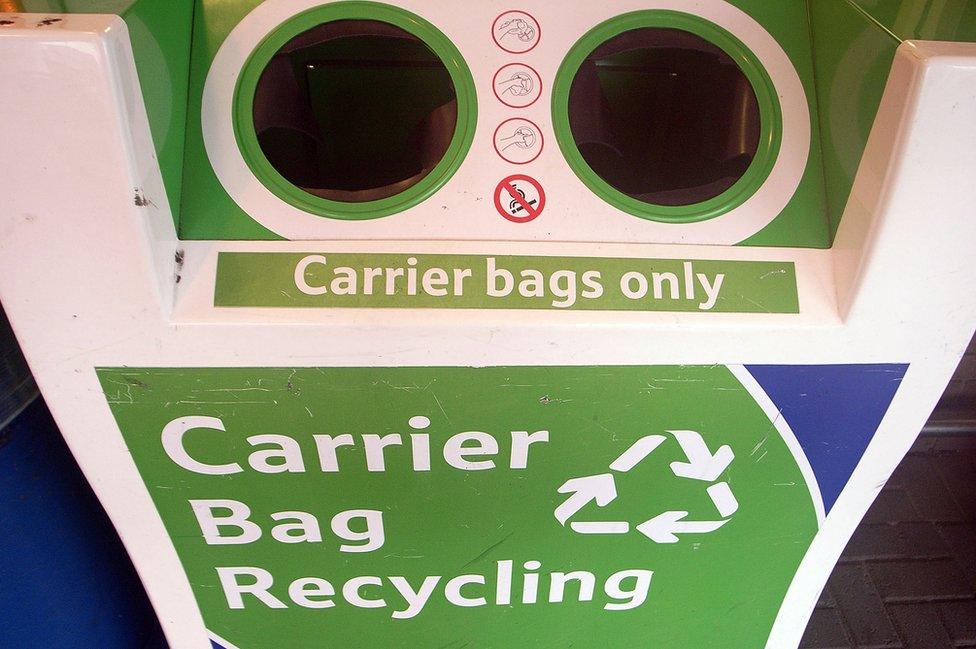
There is a strong disparity between the quantity of bags used in different home nations, however.
In England the average person goes through nearly 12 thin-gauge bags (made of plastic or paper) per month, while in Wales, where there has been a 5p charge per plastic bag since 2011, shoppers use just two bags per person per month. Before the introduction of the charge, they used 10. Northern Irish shoppers have seen a similar drop-off in bag use since they introduced a charge in April 2013, from nearly nine to fewer than two thin gauge bags used per person per month.
The reason is clear, explains Mario Campana, a lecturer in consumer behaviour at Goldsmiths, University of London. "When there is an economic disincentive involved, consumers tend not to use a product."
James Intrilligator believes the plastic bag charge will have two effects - simply having to part with money will put some people off, but there is a wider and more meaningful impact. "It'll wake people up to the fact that we use bags too much," says Intrilligator.
According to Keep Britain Tidy, 11.4% of places surveyed in England showed evidence of littered single-use plastic bags.
But the charge may be addressing the wrong issue, believes Sukhi Poonia of PAFA, the Packaging and Films Association, an industry body. "We as an industry have put our hands up and said it's an issue - plastic bags are getting chucked into the sea. But our stance is that we're never going to get better behaviour until there's tougher enforcement on littering."

But there is also an environmental impact through the production process. In 2006 the Environment Agency calculated the 82 bags required to carry the average person's monthly shop would produce as much carbon dioxide as travelling five miles by car. "People are willing to do things for the environment," says Wouter Poortinga, professor of environmental psychology at Cardiff University. "It's just they don't often think about it. When you have a plastic bag available, it's very easy to grab it and use it."
The introduction of the charge represents a change in approach towards shoppers, led by the government. In the past, the option to buy Bags for Life (at a small cost) was supposed to encourage virtue from the general public. But the figures from Wrap suggest that - with 439 million of these tougher bags issued in 2014 alone - they are still not "for Life".
Schemes run by some supermarkets, including Tesco and Sainsbury, to give shoppers who reused carrier bags extra points on Clubcard and Nectar card loyalty programmes, incentivised thriftiness. But for shoppers, and all humans, there is "a component of laziness in our actions", Campana says.
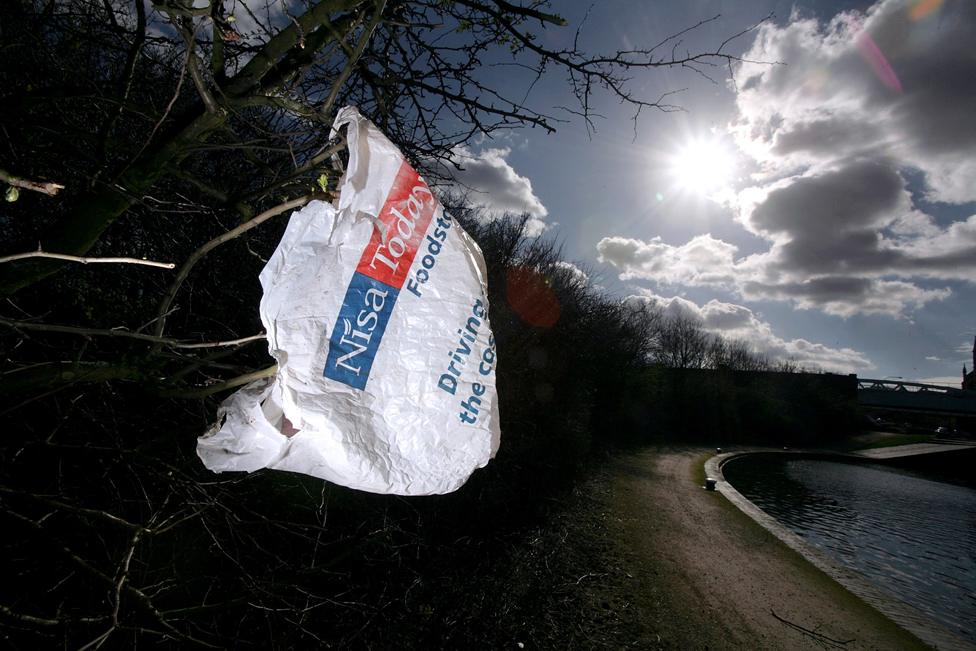
"The stick, per se, is a small one," says Intrilligator. "The amount they're charging is so little [that] for many people it's not a punitive amount."
Though it's a piffling amount for most people, will the charge make any difference to our bag use behaviour? Perhaps - when surveyed last year by Wrap, 40% of respondents said that the charge would encourage them to use Bags for Life more often - though 39% said that "it would make no difference" to their shopping behaviour. (This did include those who have already shunned plastic bags.) According to Poortinga, whenever charges have been introduced, bag usage has dropped between 50 and 90%.
In Wales, where Intrilligator lives, it has taken time for the change to become habit - partly down to inaction by retailers causing people to forget to pack their own bags. Supermarkets, Intrilligator believes, should have signs up in car parks to remind customers to take bags with them. "A lot of shopping is scripted behaviour," he explains. "They're hoping to recondition shoppers so that bringing bags in from the outside is made normal. It needs to be nudged and prompted."
Supermarkets have been preparing for the big day in different ways. Tesco has offered shoppers free Bags for Life in the run-up to the changeover to try and ease the transition.
But any store, from the highest fashion boutique to the most humble pound shop, will have to charge customers expecting to carry home their purchases in plastic bags thinner than 70 microns thick with handles. With four in every five clothes shoppers saying they use brand new carrier bags when buying items, and similarly high proportions at other shops, it will be a sea change for staff and shoppers alike.
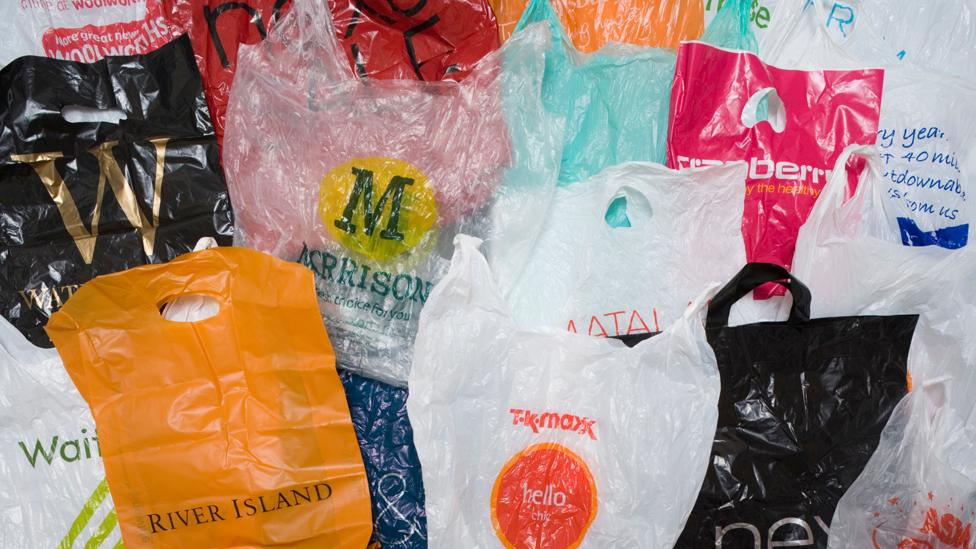
Pound shops will surely have a problem, says Soult. They will have to ensure they have enough change for customers who now need to spend £5.05, rather than a flat £5, for a five-item shop with a bag that previously would have been free. Time will tell whether this change causes tumult at the tills.

More from the Magazine
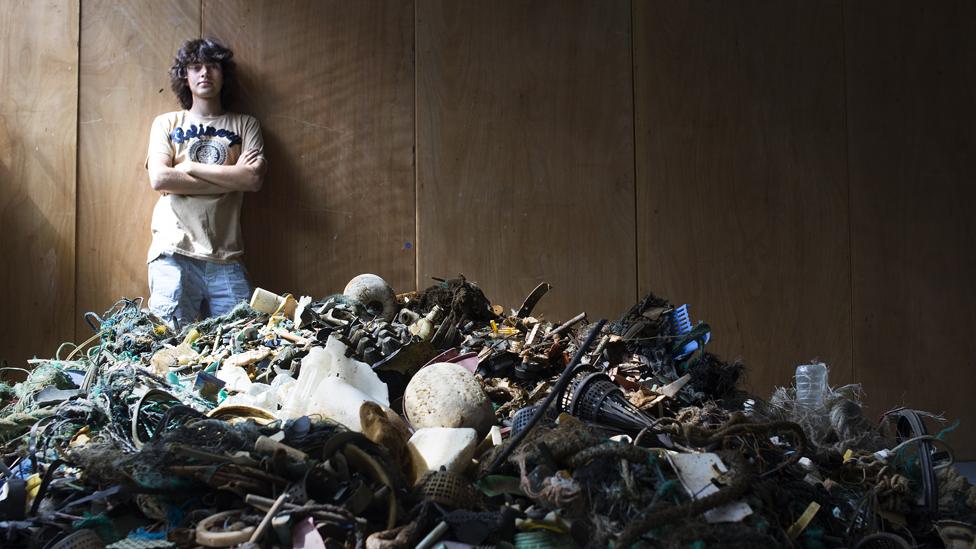
Boyan Slat is a 20-year-old on a mission - to rid the world's oceans of floating plastic. This idea came to him at the age of 16, in the summer of 2011, when diving in Greece. "I saw more plastic bags than fish," says Slat. He was shocked, and even more shocked that there was no apparent solution. "Everyone said to me: 'Oh there's nothing you can do about plastic once it gets into the oceans,' and I wondered whether that was true."

Subscribe to the BBC News Magazine's email newsletter, external to get articles sent to your inbox.